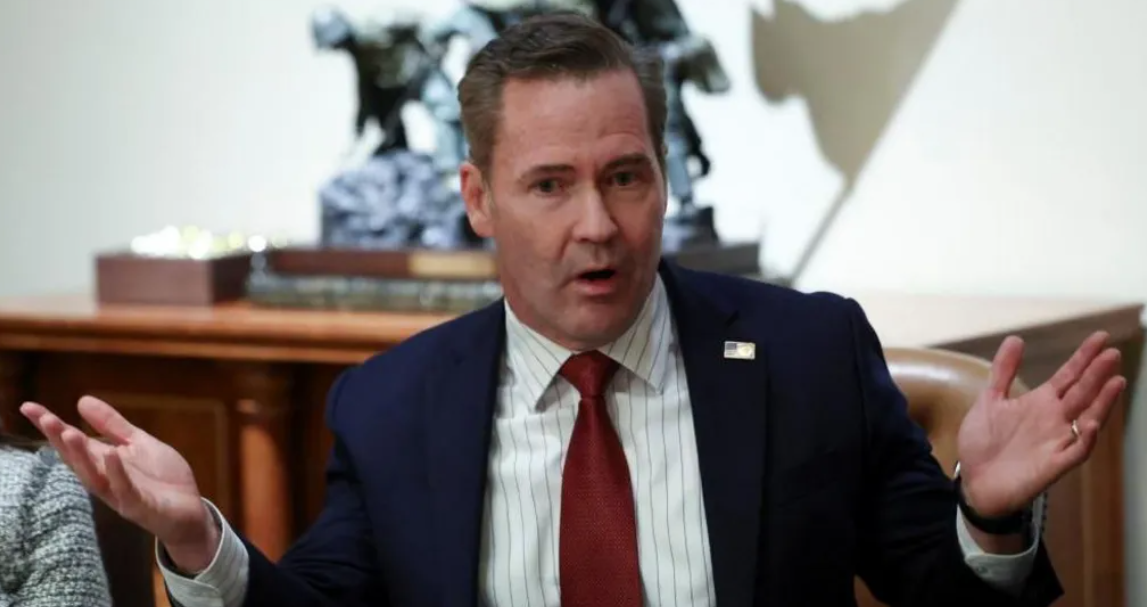US National Security Adviser Mike Waltz has accepted responsibility for a Signal group chat where senior officials allegedly discussed military strikes in Yemen– with a journalist mistakenly included in the conversation.
“I take full responsibility. I built the group,” Waltz told Fox News on Tuesday, admitting the situation was “embarrassing.”
Watch Here: Mike Waltz takes ‘full responsibility’
Despite Waltz’s admission, President Donald Trump and US intelligence leaders have dismissed concerns, insisting no classified information was shared. However, both Democrats and some Republicans have demanded an investigation, calling it a serious security lapse.
Journalist Unintentionally Added to High-Level Military Discussion
The controversy erupted after Jeffrey Goldberg, editor-in-chief of The Atlantic, revealed that he was accidentally added to the Signal chat by a user named Mike Waltz.
Goldberg, in his explosive report, claimed he had access to classified details about the weapons, targets, and timing of US strikes on Yemen two hours before the attack. While he chose not to publish those details, his report sent shockwaves through Washington.
Waltz, during his Fox News interview, could not clarify how Goldberg ended up in the chat. In a contradictory statement to Trump’s claims, he asserted that his staff was not responsible and instead blamed an unnamed contact who was meant to be part of the discussion instead of Goldberg.
“We’ve got the best technical minds looking at how this happened,” Waltz said, emphasizing that Goldberg’s number was not in his phone. He added, “I can tell you for 100% I don’t know this guy,” and revealed that he had even reached out to Elon Musk for help in tracing the issue.
Trump Calls It a ‘Glitch,’ While Lawmakers Demand Answers
Downplaying the incident, Trump told Newsmax that the leak was merely a “glitch” and had “no impact at all” on US operations. He suggested that someone on Waltz’s team at a lower level may have had Goldberg’s number.
Also read: CIA director denies air strike chat leak was major mistake
At a Senate hearing, Director of National Intelligence Tulsi Gabbard and CIA Director John Ratcliffe reaffirmed that no classified details were leaked in the chat.
However, the group chat reportedly included Vice President JD Vance and Defense Secretary Pete Hegseth, raising serious concerns about national security protocols.
Senate Intelligence Committee Vice-Chair Mark Warner strongly criticized the situation, stating, “This Signal chat situation sheds light on a sloppy and grossly incompetent national security strategy from the Trump administration.”
Secret Plans to Bill Europe for US Military Protection?
Adding to the controversy, Goldberg’s reporting exposed discussions in the chat about charging European nations for US military protection of key shipping lanes.
On March 14, a message attributed to Waltz stated that his team was working with the State and Defense Departments to “determine how to compile the cost associated and levy them on the Europeans”—a move that reportedly came at Trump’s request.
During the conversation, VP JD Vance expressed frustration, saying the military action would primarily benefit Europe, stating, “I just hate bailing Europe out again.”
Defense Secretary Pete Hegseth echoed this sentiment just minutes later, replying: “VP: I fully share your loathing of European freeloading. It’s PATHETIC.”
Lawsuit and Potential Legal Violations
The revelations have triggered a legal firestorm, with watchdog groups warning that the chat’s self-deleting messages may have violated federal record-keeping laws.
American Oversight, a non-partisan government watchdog, has filed a lawsuit against officials involved, accusing them of violating the Federal Records Act and the Administrative Procedure Act.
The group argues that by using Signal’s disappearing messages, high-ranking officials failed to preserve key government records as required by law.
As pressure mounts on the administration, one major question remains: Was this just a security blunder, or does it expose a deeper issue within the Trump administration’s handling of classified information?
